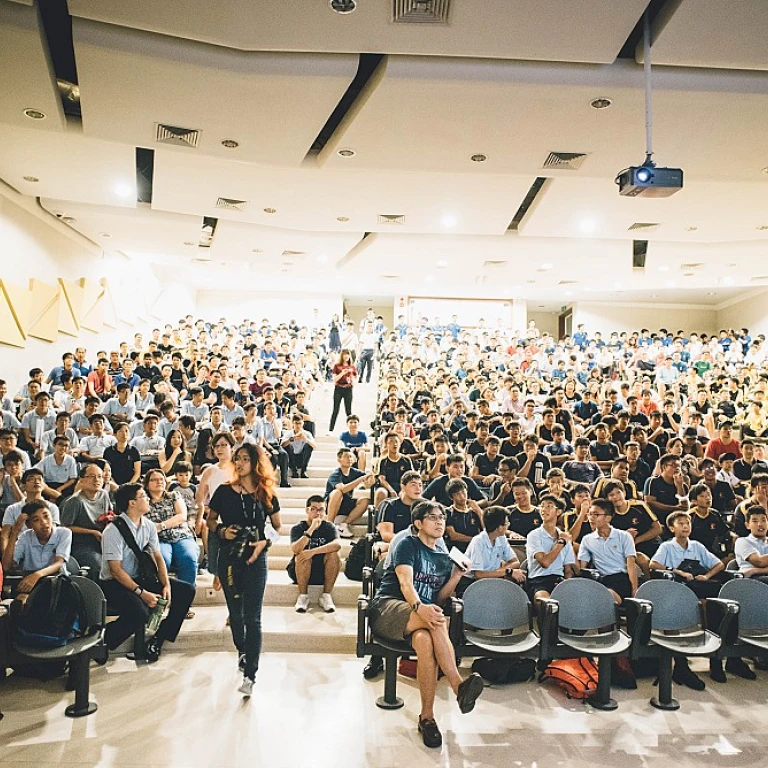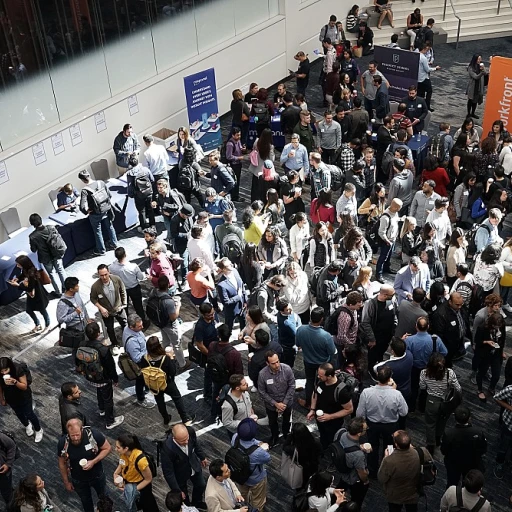Understanding the Digital Recruitment Landscape
The Evolving Recruitment Arena
In today’s fast-paced digital age, the recruitment landscape has undergone remarkable changes, shaping how companies attract and hire talent. Understanding the intricacies of this environment is crucial for organizations looking to stay competitive. The intertwining of technology and recruitment marketing has simplified the process, but it also presents unique challenges that require innovative approaches. The rise of digital platforms and tools has enabled companies to broaden their reach and connect with potential candidates globally. This evolution demands a shift from traditional recruitment methods to more dynamic and data-driven strategies. By leveraging digital marketing strategies, companies can effectively target their audience, enhancing their recruitment efforts in the process. ### Key Elements to Consider:- Digital Platforms: Embrace the power of digital platforms to reach diverse talent pools. Leveraging search engines and various online job boards can help increase visibility.
- Social Media: Utilize social media channels to build a robust recruitment marketing strategy. Engaging with potential candidates on platforms where they actively participate can amplify your employer brand.
- Content Marketing: Creating compelling content that resonates with job seekers is essential. Sharing content that highlights company culture, values, and growth opportunities can attract top talent.
- Data-Driven Decisions: Transform data into actionable insights to streamline recruitment strategies. Understanding candidate behaviors and preferences can lead to improved hiring processes. For an in-depth analysis of how workforce analytics can strategically aid in recruitment, explore here.
Crafting a Strong Employer Brand
Building a Compelling Company Image
In today's competitive job market, attracting top talent goes beyond offering an attractive salary and benefits package. Crafting a strong employer brand is about shaping a reputation that resonates with potential candidates. A solid brand communicates not only what a company does but also why it’s a great place to work. This involves more than recruitment marketing; it’s about showcasing your company culture and values. Employer branding is pivotal in setting a company apart in the eyes of job seekers. It’s about creating a positive perception that aligns with the values and aspirations of potential candidates. Authentic storytelling through digital content helps convey your work environment, career growth opportunities, and the unique benefits you offer. Highlighting employee testimonials, success stories, and social media presence can effectively communicate your brand’s voice.Connecting with the Target Audience
Your employer brand should speak directly to your target audience, aligning with the interests and expectations of the candidates you wish to attract. Utilizing social media and other digital channels is crucial for reaching a diverse talent pool. Tailoring content marketing strategies to different platforms ensures that your message resonates with the right audience and inspires them to consider your company as their next career move.Strategic Alignment and Design
Designing an employer brand should not be left to chance. It requires a strategic approach that integrates brand values into every marketing strategy across the recruitment process. Consistency online and offline in company communications ensures that your message has a harmonious and coherent resonance, reinforcing trust and credibility in the eyes of prospective employees. For those interested in exploring how companies are leveraging analytics to refine their strategies, including those of employer branding, this workforce analytics resource offers deep insights into shaping effective HR practices in alignment with your brand goals.Leveraging Data-Driven Recruitment Strategies
Data-Driven Strategies: The Key to Efficient Talent Acquisition
In the digital age, successful recruitment marketing hinges on leveraging data-driven strategies. To attract top talent, companies can no longer rely on traditional methods. Instead, they need to integrate data analytics into their recruitment strategy to make informed decisions that align with their organizational goals.
Data provides valuable insights that enable recruitment teams to tailor their marketing strategies effectively. By analyzing trends and patterns, companies gain a competitive edge in understanding the preferences of their target audience. This insight helps employers craft job descriptions and content marketing that resonate with potential candidates, enhancing the candidate experience.
Moreover, recruiting is not just about filling open positions. It’s about building a robust talent pool that aligns with the company culture and work environment. With data-driven recruitment, organizations can identify the channels through which their ideal candidates engage most frequently, whether it be social media, online job boards, or career networks.
Companies must also focus on search engines and executive search as part of their strategy. Analyzing which keywords attract the most traffic and how top talent navigates through digital platforms helps refine digital marketing efforts. Aligning recruitment marketing with potential candidates' digital behavior ensures that your employer brand remains visible and attractive to top talent.
As businesses strive to stay ahead in recruitment marketing, integrating predictive analytics and other advanced tools is essential. These tools help anticipate future hiring needs and mitigate risks, ensuring a seamless recruitment process that supports the overall recruitment strategy. Explore how industry leaders are mastering this approach, shedding light on the latest series in human resources innovation by exploring leading names in digital business transformation.
Utilizing Social Media for Talent Acquisition
Strategic Use of Platforms to Capture Attention
To successfully attract top talent in the digital age, harnessing the power of social media can no longer be an afterthought. Social media platforms aren't just for sharing content; they play a crucial role in recruitment marketing by helping companies reach a broad audience of potential candidates.- Brand Visibility: First and foremost, being active on social platforms helps boost your company's brand visibility. When candidates explore potential employers, they often look to see how active and engaged a company is digitally. A strong presence can effectively enhance your employer brand.
- Target Audience Engagement: Different social media networks serve different functions and attract varying demographics. Understanding where your target audience spends their time online is crucial. For example, platforms such as LinkedIn are frequented by professionals seeking career opportunities, while Instagram might be more appealing to younger job seekers.
- Tailored Content Marketing: The content shared should reflect your company culture and values to resonate with potential hires. Content marketing strategies involving authentic stories from current employees, job opportunities, or showcasing career growth paths can capture the interest of high-quality candidates.
- Recruitment Strategy and Metrics: It's important to employ a comprehensive recruitment strategy that uses real-time data from social media campaigns. By measuring engagement metrics and refining your approach based on this data, you can optimize your reach and attract more relevant talent.
- Engagement and Authenticity: Boosting engagement goes beyond promoting job openings. Engage in dialogues, answer queries, and create a community feel. Authentic and transparent interactions offer a more robust candidate experience, building credibility and trust.
Implementing AI and Automation in Recruitment
Embracing AI and Automation in Recruitment
Recruitment marketing has come a long way in leveraging technology to attract top talent. The digital age has revolutionized the way companies interact with both potential candidates and current employees. AI and automation are powerful tools that can streamline recruitment processes, making them more efficient and effective. Automation tools enable recruiters to manage routine tasks, allowing them to focus on strategic aspects like building a strong employer brand and enhancing the candidate experience. By automating tasks such as job posting, resume screening, and scheduling interviews, companies can significantly reduce time-to-hire and operational costs. AI-driven solutions can analyze vast amounts of data to identify patterns and trends that are beneficial for talent acquisition. These insights help organizations tailor their recruitment strategies to better match the job seekers' expectations and the company's hiring needs. Companies adopting AI can quickly spot top talent and engage with them effectively. AI also enhances the candidate experience by personalizing interactions and providing timely responses. Job seekers appreciate a seamless, efficient process when applying for job positions and are more likely to have a positive view of the company as a result. It is essential for businesses to stay ahead in their recruiting efforts by implementing digital marketing strategies that incorporate the latest technologies. AI and automation are vital components of a robust recruitment marketing strategy that aims to attract and retain the best candidates.Building a Candidate-Centric Recruitment Experience
Creating a Personalized Journey for Potential Candidates
Building a candidate-centric recruitment experience involves crafting a personalized journey for each potential candidate. Companies must recognize that job hunters don't just seek a paycheck; they pursue an engaging experience that echoes their values and career aspirations. Crafting such an experience doesn't happen overnight, but with a structured approach, it is entirely achievable. Understanding your candidate's needs is crucial for your recruitment marketing strategies. Researching your target audience allows you to tailor your approach. This knowledge becomes the foundation for the content and interactions that guide candidates through the recruitment process. A focus on candidate experience can significantly influence job seekers' perceptions of your company as a desirable place to work.- Transparent Communication: Maintain regular communication with candidates throughout the hiring process. This involves providing clear, timely updates and setting realistic expectations about the job and company culture.
- Responsive Interaction: Embrace digital tools that allow your recruiting team to quickly respond to candidate inquiries. Whether through email or social media channels, responsiveness can enhance the perception of your employer brand.
- Feedback Loop: Collect feedback from candidates, whether they were hired or not, to continuously improve the recruitment journey. Insights gathered can inform adjustments in your recruitment strategies.
- Seamless Process: Use AI and automation to streamline activities such as applicant tracking, interview scheduling, and onboarding processes. These technologies can enhance the recruitment experience by offering efficiency without losing the personal touch.








